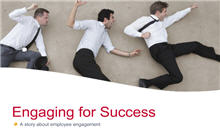
Work with meaning engages people
According to HR professor Laurent Taskin, the affective dimension is the main engine of engagement, but engagement also has a conscientious and a calculated side. “Managers need to recognise the employee in his role. But you also need to have him do useful work and aspire to fairness.”
Professor Taskin distinguishes three forces that drive engagement.
“The driving force behind engagement is meaning, directly connected to the figurative wealth of a job. Employees need to be able to give meaning to their work. This meaning goes beyond the mere result employees achieve. Meaning is always in relationship to something else, in particular to the opportunity to learn more and the possibility to be able to work autonomously. In some Knowledge Intensive Firms, knowledge-based companies active in consulting or R&D, knowledge experts are sometimes allowed to spend one day of the week on personal research. The research needs to be related to the company project though.
The second factor is recognition. An employee needs to have the feeling that his superiors are also thinking about this career, his development and his expectations. There need to be plenty of consultation moments when the manager listens to where the employee wants to be heading. This allows a career to be adjusted to the changing expectations of not only the individual, but also the company. The dialogue with the employee needs to be kept as active as possible. He also needs to know what opportunities he might be offered to develop.
These career consultation moments are missing in the 50-plus category. They suffer the most from a lack of recognition. To them it sometimes feels as if they are not worth investing in. 50-plus employees are very sensitive to this. A mentor programme could acknowledge them in a new role for instance, provided they experience this role as something useful.”
“The third driving force behind engagement is what I call 'the feeling of fairness at work'. This feeling makes sure employees are morally behind the company and its decisions. Decisions considered as unfair damage loyalty to the company: a weird promotion for a colleague, a seemingly unfair dismissal. Why should an employee be loyal to a company that acts inexplicably or even unfairly? A manager needs to ask himself: 'When do my decisions appear unfair?' A more fundamental question is: 'Is my HR policy good, in the sense that it is also fair?' Employers who solely make decisions to maximise profit will see engagement in their company drop. Managers who don't only have economic motives, but also look at a wider social context and communicate about it, will have more success in the longer term.”
You can read the full interview in Scoop op Mens en Werk no. 33 (appears on 30 June 2011).
Laurent TASKIN is doctor in Applied Economics and professor at the Louvain School of Management (FUCaM) and the Labour Science Institute (Institut des sciences du travail - UCL). He teaches HR management and organisation management. As co-director of the Centre for Research in Entrepreneurial Change and Innovative Strategies (CRECIS), he researches changing organisations in HR, more specifically new forms of work organisation and information sharing processes.





